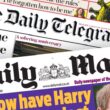Quick read. The London-based Mark Allen Group (MAG) is buying Rhinegold, the long-time publisher of Music Teacher, Classical Music and Opera Now magazines, and the Music & Drama Education Expo. The price is believed to be less than £500k.
The privately-owned Rhinegold is believed to employ some 20 people and has revenues of under £2m (some 60% from advertising). Its owner Derek Smith was a former Hong Kong-based executive of The Economist. In the pre-internet 1980s, he was also a founding director of Dan Wagner’s painfully pioneering MAID online companies database which, after its reverse takeover of Dialog Corp and the 2000 stock-market crash, was dubbed “Dial-a-dog”. Smith has had altogether more fun managing the Rhinegold portfolio of magazines and events, which he acquired in 2007, 30 years after its founding launch of Classical Music.
Rhinegold will now join MAG’s music portfolio which includes the venerable 95-year-old Gramophone and also Jazzwise and Songlines. MAG chairman and founder Mark Allen had a nice line in flattery, saying he had been stalking Rhinegold for years. In fact, he has been far too busy acquiring a widening range of under-nourished B2B and special interest magazines from UK companies large and small. Deal after deal has funnelled into a vibrant group now with revenues of £45m.
It’s all a long way from the former daily newspaper journalist who joined Reed Business Information to launch Community Care for Britain’s social services in the money-spinning 1970s, when UK weeklies were stuffed with job ads. Subsequently, after a muddy spell at International Thomson, Allen left with the medical magazines he had been managing for the fickle B2B publisher. That was the 1985 start of MAG.
As a try-everything learn-as-you-go entrepreneur, Allen’s early experience in running conferences alongside B2B magazines prepared him well for a time when events are so often the main earner. The company’s growth has reflected the founder’s enthusiasms for content-rich professional media, the social-health-education sectors – and music. MAG now has more than 70 brands and organises over 200 events in diverse markets. Its strongest brands include: Print Week, British Journal of Nursing, Eureka!, Optician – and the 43-year-old Community Care acquired in 2017 (“A dream come true”).
There’s distinctiveness in the relentless rise of Mark Allen beyond his insistence that digital and print can both ‘work’ in B2B. The company, almost 40% of whose revenue comes from advertising (just ahead of exhibitions), exudes an energy and optimism that’s difficult to find in a world of ravaged multi-market B2B groups. Many of MAG’s 350 people (30% do content) are based in a 150-year-old converted church in a south London suburb, and the company makes 18% EBITDA margins on revenue that has multiplied five times in the past 10 years.
That decade of rapid growth builds the promise for what might come next for the privately-owned MAG in a UK market where there are plenty more under-loved media brands and companies.
Mark Allen (whose son Ben has been CEO for the past six years) is as noisily impatient as ever. In his statutory accounts for 2016-17 – a year of five acquisitions – the chairman criticised his company’s first decrease in EBITDA for six years, despite a 17% rise in revenues. It stormed back the following year. Turn up the music.



